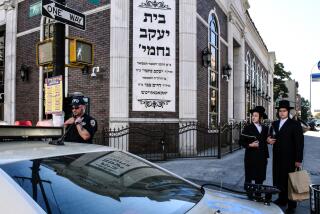1492 Expulsion of Jews From Spain Exaggerated in Scope, Scholars Say
- Share via
This year, amid commemorations and critiques of the 500th anniversary of Christopher Columbus’ voyage from Spain into the unknown, scholars are examining another quincentennial with a critical eye.
The expulsion of all unconverted Jews from Spain in 1492 during the notorious Spanish Inquisition was long thought to have involved as many as 300,000 Jews.
Historians have said the expulsion had a disastrous effect on Spain’s economy, forcing out most of its financial wizards.
Now, five centuries later, the expulsion has drawn apologies from the Spanish crown and church. And in one of several conferences reassessing the forced exodus, scholars gathered at USC on Monday said that the event--although still the largest expulsion of Jews from any country during medieval times--was exaggerated in its scope and impact on Spain.
Moreover, according to one provocative paper presented, influential schools of Jewish mysticism in Spain engaged in speculation about the nature of God that made it easier for intellectual Jews to become willing converts to Christianity.
“This is an issue that is usually swept under the rug,” said USC’s Moshe Lazar, a co-organizer of the three-day conference, which ends Wednesday and has drawn scholars from Jerusalem and Spain.
Lazar, in an interview, said that the anti-Jewish ferocity of the Spanish Inquisition, which began about 1480, derived partly from prominent Jews who had willingly converted.
“These new Christians became more zealous in persecution of fellow Jews than the simple Christian bishops in their ranks,” Lazar said.
In Jewish mysticism, some rabbis explored different aspects of God, a practice that diluted the Jewish idea of monotheism. In that context, said New York-based researcher Jose Faur, the Christian Trinity of Father, Son and Holy Ghost “after all, was not so alien a system.”
Without denying that in the century before the 1492 expulsion many Jews converted under duress, Faur, who is affiliated with the Sephardic Heritage Foundation, said that Jewish mysticism was a contributing factor to Jewish apostasy in that period.
The heresy-seeking Spanish Inquisition was aimed especially at the conversos , Jews who had converted but were seen as backsliders in beliefs and practices. Scores of Jews were tortured and burned at the stake, but because so many Jewish Christians lived so close to unconverted Jews, King Ferdinand and Queen Isabella issued the 1492 edict to expel all Jews from Spain.
The numbers who left rather than profess Christianity “was probably 50,000 or 60,000,” said Stephen Haliczer of Northern Illinois University, conference co-organizer with Lazar.
“About 20% of them returned shortly afterward, and documents show that many got their land back from Christians, although they had to convert to do it,” Haliczer said.
Because the numbers of Jews who left Spain for good was considerably lower than the usual estimates of 150,000 to 300,000, the impact on Spain was not so great, Haliczer said.
Norman Roth of the University of Wisconsin attempted to explode some additional “myths” in the conference’s opening paper.
Roth said that a “golden age” of Spanish Jewry did not start with the Spanish reconquest of Muslim-dominated Spain in the middle of the 13th Century but began centuries before when Islam was the most powerful religion.
Many historians have said that Jewish-Christian relations gradually worsened after outbreaks of anti-Semitism in 1391. But Roth cited examples of trust between Jews and Christians well into the 1470s.
“Literally up to the year 1492, (examples are found) of friendly business relationships continuing,” Roth said.
Lewis Barth of Los Angeles’ Hebrew Union College, presiding over the first session of the conference, said the revised views “may be very threatening for Jewish communities today.” Jewish leaders have denounced claims by so-called revisionists that the Nazi-era Holocaust never took place or was blown out of proportion--theories that have been discredited by Jewish and Gentile scholars.
But regarding Spanish Jewry before 1492, Barth said, scholars are only trying to find out what really went on. “The business of history is to find the most likely story,” he said.
More to Read
Sign up for Essential California
The most important California stories and recommendations in your inbox every morning.
You may occasionally receive promotional content from the Los Angeles Times.










